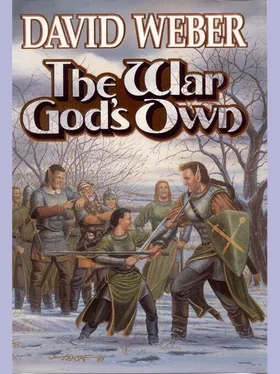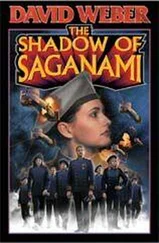As a race, dwarves were probably the finest engineers ever born-certainly their people took the deepest pleasure in working with earth and stone and iron, for it was in their blood. Historically, however, they had always been the most insular of the Races of Man, tending to keep themselves (and their secrets) to themselves. Few among them had truly valued-or even understood-the elves' soul-deep love for the beauty of poetry, art, and music or humans' restless energy and hunger for experimentation and change. But the fusion of peoples which had created the Empire of the Axe had made dwarf, elf, and human partners as never before, bringing all those qualities together in the "mongrelization" the Purple Lords so despised… and had never been able to equal.
And however contemptible the Purple Lords found the Empire's half-breed pedigree, the fruit of the Axemen's labors were obvious to Bahzell and Brandark as they gazed out over Belhadan on a cold winter's day. The deep bay which served the city was smaller than Bortalik Bay, but it was vast enough. There was room and to spare for twice a hundred ships on its sun-streaked, wave-wrinkled cobalt, and the city spread up the sheer mountains above it like some enormous flower petaled with steep-pitched roofs of slate and tile. It showed the unmistakable impress of dwarvish engineers, and not just in the massive breakwaters which joined the islands off the bay's mouth to protect its moorings even in the wildest weather, yet human and elvish influence was equally obvious.
No other race understood stone as dwarves did, and Belhadan was unquestionably the work of their hands. But dwarves had always favored straight lines and soaring heights fused with functionality, and their love of stone had never blunted their urge to master it and make it conform to their desires. In many ways, they were at least as intractable as their beloved rock and iron, and their solution to a problem was generally to tackle it head-on. If a hillside or mountain blocked the path of a roadway, a dwarvish engineer went straight through the obstacle. He was quite capable of going around it, instead; it was simply that the idea of detouring would never enter his head unless someone else put it there.
Clearly, someone had done just that for Belhadan's architects, for the city was intimately entwined with the mountains in which it had been planted. Rather than subdue those mountains, it embraced them and followed their contours with streets and small, intimate plazas, brick-paved squares and terraced courts. But it also shaped those contours, utilizing them with a subtle efficiency which allowed them to be themselves yet bent them to the service of Belhadan's citizens, as if a "normal" city had been divided into portions and inserted with loving care into mountains untouched by mortal hands. Natural cliffs and steep slopes furred with evergreens loomed above broad squares and avenues designed for commerce, trade, and places of government. Satellites of homes and shops swept up those slopes, like surf spouting up through fissures and flues, while residential avenues trickled down to meet the wide roadways required by freight wagons and merchant caravans. Regularly placed street lamps-not the torches most cities Bahzell had seen used for street lighting (if they used any at all) but big, square lanterns on green-painted pillars-stood like sentries, joined by waist-high chains which separated the streets from wide, flagged sidewalks, and the thought of how they must look from a distance at night as they traced the arteries of the city through the darkness like Silendros' own stars touched Bahzell with a wondering awe. And under the surface, tunnels and galleries sliced through those same cliffs, burrowing deep into their foundations to provide streets, taverns, warehouses, ropeworks, ship chandlers, and a hundred different kinds of businesses-all carved deep into living rock without disturbing the mountains' rough-spined beauty.
Nor had Belhadan's builders neglected its defense. Walls as mighty as those the Purple Lords had raised to protect Bortalik reared behind the busy wharves and docks; the huge Royal and Imperial naval base, enclosed within its own walls; and the winter-idled shipyards. A raiding fleet might ravage the docks, if it could strike with numbers enough, but no seaborne force could breach those walls so long as the defenders had strength to man them, and the landward fortifications were even more imposing. The impress of dwarvish engineers was most obvious there, for military considerations had been foremost in their design. Yet in an odd way, the harsh, uncompromising lines of wall and tower only emphasized the love with which Belhadan had been fitted into its surroundings. Entire slopes had been quarried away into man-made cliffs, many pierced with the slits of tunneled archers' galleries. Their bare stone rose to the walls and towers which crowned them, impregnable, and yet less like fortification against outside foes than like dikes, holding in the greenery and life of the city.
Bahzell and Brandark had seen wonders few of their kindred could have imagined in the months since they'd fled Navahk. They'd passed through Esgfalas, Derm, even fabled Saramfel, where elven lords who remembered the Fall itself ruled, yet Belhadan touched them as none of those other cities had. It was larger than any of them, older than Derm yet far younger than Saramfel, and it had a strength-a sense of itself and a bright, confident vitality-wholly and uniquely its own. They felt it singing in the ice-cold air as they followed Vaijon through the rousing bustle of morning streets, the early cries of vendors, the laughter of apprentices sweeping and shoveling the night's snow from streets and walks. It took all their self-discipline not to gawk like the yokels Sir Vaijon obviously considered them, yet a part of them pitied the people about them, for Belhadan's citizens were too close to the wonder the hradani perceived so clearly to recognize how remarkable their city truly was. This was their home. They took it-and themselves-for granted as they got on with their lives, and perhaps only barbarians who knew from grim experience how thin a line stood between peaceful prosperity and ruin could truly appreciate the wondrous thing which had been created here.
Bahzell shook his head as the wish that his father could see this slid through his thoughts. Prince Bahnak would have grasped the wonder of a people so secure in the safety of their city that it never even occurred to them to think about it. He might not have fully understood something so foreign to his own experience, yet it was the end towards which he worked, the reason he had imposed his will on the other clans of the Horse Stealers. Oh, Bahzell knew his father too well to see him as a saint, and he knew how much Prince Bahnak enjoyed the game, how he relished the conflict and competition of building an empire where there had been only anarchy. Yet he also knew there were depths within Bahnak, hopes his father might never have fully defined even for himself, and he recognized the millennium-old heart-hunger of his people for the chance to be like the people bustling through Belhadan's streets, clapping their hands together against the chill, huddling into coats and cloaks for warmth, hurrying about their business and eddying aside as they suddenly recognized the hradani in their midst and gave them a wide berth.
For the chance, Bahzell realized, simply to be , and to let others be, without warlords and the constant need to watch and ward. That was what his father wanted to bring to the northern hradani, whether or not he'd ever put it into so many words, and Bahzell felt suddenly humbled and ashamed for all the years in which he hadn't understood. But he understood now, and in understanding that, he also understood why the Dark Gods opposed Bahnak. The Dark fed on suffering and despair, for it was those who saw no other hope of saving themselves or those they loved who turned their backs upon the Light. It was those conscious only of their helplessness who would make any bargain with anyone who promised them strength, and who could blame them if they did?
Читать дальше












